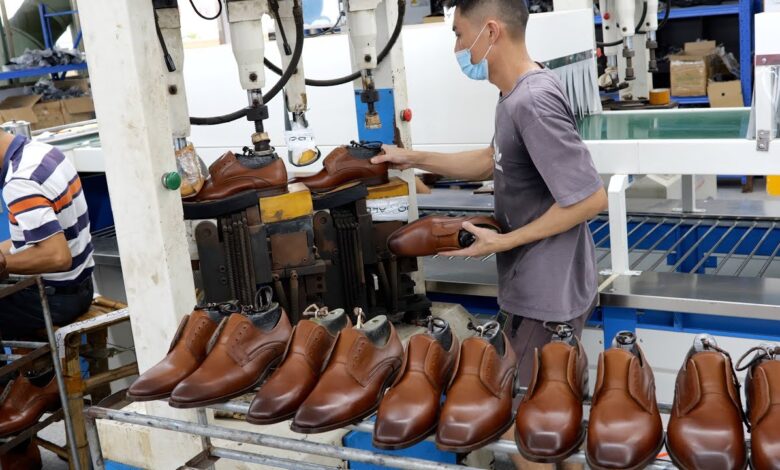Why Footwear Manufacturers Are Turning to ERP: Challenges, Solutions, and Benefits

With the growing footwear manufacturing industry in India, companies are constantly looking to streamline operations, provide the highest quality at the lowest cost, and respond rapidly to market volatility. The constantly changing consumer tastes and increasing complexity of global supply chains require manufacturers to implement strong technology to remain competitive. This is where ERP for the footwear industry comes in.
ERP software solutions provide an integrated approach to manage different business processes, from raw material procurement, and production, to inventory and sales. Make sure to hire a trusted ERP software company in India like Autus Cyber Tech for industry-specific solutions. But what is motivating footwear manufacturers to implement ERP solutions, and how are these serving the specific needs of the sector? Let’s discuss this in the blog below.
Common Challenges of the Footwear Manufacturing Industry
1. Complex Supply Chains
The footwear production involves various suppliers, contract manufacturers, and raw materials companies in different locations. Without centralized oversight, monitoring shipments, tracking delivery times, and managing logistics can be a nightmare.
2. High Product Variability
One shoe style might have dozens of variations — by size, by color, by material. Without the proper tools, managing this level of complexity could result in inventory imbalance, suboptimal production, and unhappy customers.
3. Demand Volatility
Fashion and seasonal trends have a significant impact on the sales of footwear. Stockout, or even overproduction, can be costly due to a lack of accurate demand forecasts, resulting in excess inventory.
4. Quality Control
In a field where the brand image is the only thing, maintaining quality is non-negotiable. Without strong monitoring and quality checks in your development workflows, it’s possible for unchecked bugs to sneak in.
5. Compliance and Sustainability Pressures
Environmental laws, labor laws, and more ethically-minded consumer demand are just a few of the factors forcing today’s footwear companies to have transparent, visible operations.
How ERP Systems Solve These Problems in the Footwear Industry
ERP for the footwear industry provides a central solution for the control and automation of basic business processes. Here’s how it enables manufacturers to address these challenges:
1. Supply Chain Integration
ERP systems pool data from suppliers, logistics companies, and production teams into a solitary source of truth. This transparency enables manufacturers to predict disruptions, fine-tune delivery times, and cut lead times.
2. Product Lifecycle Management
It has become much easier over the years to handle thousands of product variations with an ERP. Configurable modules help monitor the design, development, and production phases, which can help you maintain consistent quality and accelerate time-to-market.
3. Accurate Demand Forecastings and Inventory Management
Real-time data analytics are used by ERP systems to enhance forecasting accuracy by studying historical sales, market designs, and seasonal requirements. Optimizing inventory to match demand while not overstocking or understocking.
4. Production Efficiency
In footwear manufacturing, ERP software automates production planning, scheduling, and shop floor control. This cuts the amount of manual checks being made and errors and helps to keep production in line with the true demand for a product.
5. Compliance and Sustainable Development
ERP for the footwear industry provides traceability throughout the entire production- from raw materials to finished products. This allows companies to be in compliance with regulations and show transparency behind sustainable practices.
Primary Advantages of ERP Software for Footwear Manufacturers
1. Increased Agility
Thanks to the centralized data and the insights in real-time, manufacturers can react quicker to market changes, bring designs to market faster, and know when to benefit from trends.
2. Cost Reduction
A reputable ERP software company in India will offer a system with tools that make processes more efficient, diminish waste, and lower the need for duplication. Improved demand planning means reduced holding costs and less obsolete stock.
3. Increased Customer Satisfaction
ERP systems enhance order accuracy, reduce lead times, and underwrite dependable delivery schedules-which are crucial to consumer satisfaction and brand loyalty.
4. Data-Driven Decision Making
With ERP tools, manufacturers can make data-based decisions based on current information rather than outdated, or instinct-based knowledge. In a rapidly evolving industry, this is a strategic advantage.
5. Scalability
As a shoe company expands, so too do its ERP systems. Venturing into new geographies, introducing new product lines, or integrating with e-commerce platforms, whatever your growth strategy is, ERP systems offer you the elasticity for growth sustainability.
Looking to implement the best cloud-based ERP for your footwear manufacturing business? Your search ends with Autus Cyber Tech by your side. Book a consultation with us today.



